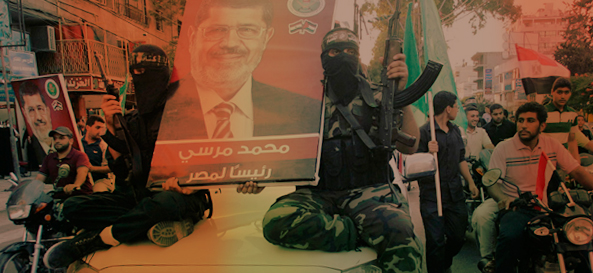
In light of President Mohammed Morsi’s recent reaffirmation of Sharia as the basis for law and order, Egyptian Christians are wondering whether democracy will come at the cost of peace and their personal and religious freedoms.
Riot police were dispatched, and tear gas rained down on thousands of anti-Morsi protesters outside the presidential palace in Cairo on Tuesday. Yet hope was hard to come by that peace would prevail between Islamist supporters and opponents, who include secularists, liberals and Christians.
The upcoming referendum on the hastily assembled draft constitution will be held on December 15. The constitution will determine the powers of the president and parliament as well as defining the roles of the judiciary and the military, which had been in a position of great power for decades until autocrat Hosni Mubarak’s regime was toppled. It will also lay out the role of Islamic law, known as Sharia.
“Like most constitutions the draft constitution is written is very generic language,” says Daniel Hoffman, advocacy and development director with Middle East Concern. “What will determine how the constitution influences people’s lives is how it is interpreted and implemented by the government.” Many Egyptians, including Christians, do not feel optimistic regarding the current government. The Christians, like the other religious minorities and many Muslim Egyptians, would favour an Egypt that deals with its citizens on the basis of their citizenship irrespective of their religion. The rule of the current government gave rise to fears that this is not the government’s view.
The new draft retains the principles of Islamic law as the basis of legislation and includes an article stating that al-Azhar, Egypt’s leading Islamic institution, must be consulted on matters related to Sharia. It says the state will protect the “true nature of the Egyptian family” while promoting its “morals and values”—yet these broad statements do not sit well with many Christians in Egypt, of which the majority are Coptic Christians, known as “Copts.” Almost 13 percent of the population in Egypt is Coptic and about 4 percent are evangelical, according to Operation World.
Widespread protests were first sparked on November 22 when the newly elected, Muslim Brotherhood-backed president made what some called a dictator-ish power grab and what others call a sound decision in the interest of preserving a fledgling democracy. Morsi put himself beyond the reach of judicial review until a new constitution and parliament is put in place. This outraged the Supreme Judicial Council and secular and Liberal Egyptians, but Morsi defended his actions saying the new powers were needed to push through democratic reforms after decades of rule by Arab Spring-ousted dictator Mubarak.
Some say it is important to at least consider there may be merit to Morsi’s strategy. “It’s all well and good to say that a president placing his decisions above any judicial review violates a principle of distributed authority, and in the abstract, I think everyone would agree with that,” says John Esposito, a professor of Islamic studies at Georgetown University and founding director of Prince Alwaleed Bin Talal Center for Muslim-Christian Understanding. He continues, “But if the judiciary is acting as a holdover from the Mubarak era in a last-gasp effort to bring that era back, then as scary as his actions may be, it might be best to see how it plays out—making clear that the government will be judged and policy will be formed accordingly based on whether there is a credible path back to judicial review that is meaningful.”
But there may be little opportunity to see how anything plays out, since it looks like the referendum will be derailed. Protestors aren’t just upset with the content of the Constitution, but also with the way in which it was rushed through the process with only 85 out of the 100 court members actually present and the rest boycotting.
Over 200,000 have gathered in Tahrir Square over the last couple of weeks in protest against Morsi’s decree and the Constitution—which is supposed to be the cornerstone of a new, democratic Egypt. At least three have been killed and many more injured. It is unclear whether opposition will rally to vote against or simply boycott the referendum, but either way, the validity of the vote will be called into questions and will almost certainly lead to more clashes.
Mubarak’s autocratic leadership endured three decades, and while Christians endured persecution under Mubarak, there has been a marked increase in lawlessness in recent months, says Voice of the Martyrs spokesman Todd Nettleton. He says while the kidnappings of Christians, for example, were not uncommon before the uprising, they have certainly becoming more prevalent. “Typically a Christian girl is kidnapped, and then sometime later a video will be released of the girl in proper Muslim clothing saying that she left her home willingly and has willingly converted to Islam,” he says. But when the girl’s family complains, he explains, the police will point to the video as evidence of her voluntary conversion. But the girls who escape tell another story—of violence, gang rape and coercion. “And this is happening in a culture where being raped is an incredibly shameful thing. Even if a girl escapes, her life is in some ways ruined forever because of what happened,” says Nettleton.
He says there is a great deal of fear among the Christians in Egypt about what the future holds for them. “They do not trust the Muslim Brotherhood–which Morsi was a part of–to provide any sort of religious freedom or protection for the Christians of Egypt,” he says. “And it seems that their fear is well founded. In the months since the revolution, there have been more attacks and less accountability for the attackers.”
For Nettleton, recent events in Egypt evoke memories from his own childhood in Iran. “I am reminded of when the mullahs [spiritual Islamic leaders] came to power in Iran even though I was only nine years old,” he says. “The mullahs took over, and they immediately adopted Sharia law and told the people of Iran, ‘We are going to run the whole country according to Islam. Finally we can be all that we are supposed to be as a country, because we are doing everything according to the Koran and Allah’s will.’” He says many Christians feared the church would be wiped out, but today Iran supports the fastest growing churches in the world. He says for many Iranians, the failures of the government have become the failure of Islam and as many question the government, they also question Islam.
“So as we see this political battle going on in Egypt, and as it appears more and more likely that Islam will become the driving force of the government and the authorities there, it is easy to get discouraged,” Nettleton says. “But we must remember that God is still at work and out of this He can grow and strengthen and build His Church.”






















